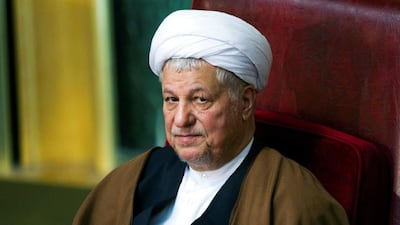Akbar Hashemi Rafsanjani, the founding member of Iran’s 1979 Islamic Revolution and president for two consecutive terms, died this week. He was 82.
Rafsanjani was known for his close ties with the current supreme leader, Ayatollah Ali Khamenei. However, their relations soured over the disputed presidential elections in 2009, when Rafsanjani shifted his political allegiance towards reformists.
Writing in Arabic-language newspaper Aletihad, the sister publication of The National, Dr Sultan Mohammed Al Nuaimi said that a host of questions were raised about the possible repercussions – inside and outside Iran – of the death of the former leader, who left a political void.
“Rafsanjani could not be considered a member of the reformist bloc,” noted Al Nuaimi. “Yet he had obviously shifted away from the fundamentalist movement represented by the current supreme leader and the Revolutionary Guards.”
According to the writer, Rafsanjani's very presence“lent great support to the moderate-reformist bloc. He has always been a source of acceptance and agreement among the bloc’s symbols. He was expected to act as president Hassan Rouhani’s main support in the presidential election in May”.
As such, Al Nuaimi believed that the passing of Rafsanjani would have adverse effects on the moderate-reformist bloc.
The Rafsanjani era is still seen as one of moderation and openness to Gulf countries, the writer noted. However, it was only partly true, he argued.
“Iran’s openness to the outside world cannot be separated from the reality of the era and the interests of the Iranian regime that supported that openness to rebuild the country. The same applies to the nuclear programme and the efforts to lift the economic sanctions that were imposed on the country.
He concluded that Rafsanjani’s more or less moderate way of dealing with the region was not at the expense of the strategic interests of the Iranian regime that alternates between moderation and intransigence.
Writing in the London-based Al Arab, Lebanese columnist Ali Al Ameen considered Rafsanjani and Ayatollah Ali Khamenei as the only constants in Iranian power since the formation of the Islamic Republic.
“Owing to his role in Iran’s inner equations, Rafsanjani was kept in power at the end of his two mandates.
“A new position – namely president of the Expediency Discernment Council of the System – was created for him and he became a party to the equation of power,” Al Ameen said.
When the supreme leader and Revolutionary Guards took power, they succeeded in suppressing all forms of opposition. However, “they could not control Rafsanjani even though he had lost ground. Despite being pressured, he did not declare his allegiance to Ali Khamenei. On the contrary, he conveyed messages from time to time to the Iranian people expressing his dissatisfaction with many policies,” Al Ameen noted.
In spite of the former president’s old age, Iranians had continued to count on his reformist role.
The writer said that Rafsanjani's demise had cut the rope of reform. “It is the rope that linked the principles of Islamic revolution with the possibilities of making Iran a modern state," he wrote.
“Rafsanjani maintained his ties with Iran’s ideological authority despite tensions, while encouraging reformists to embrace change under the umbrella of the revolution.
“He enjoyed the revolution’s legitimacy being one of its symbols and had ruling experience that allowed him to tread the path to reform without being questioned. With his death, the chances for reform have gone,” Al Ameen wrote.
“With his departure, the political process in Iran is likely to be affected by more rifts between the religious ideology represented by the supreme leader and the Revolutionary Guards, as hopes for reforms are lost.
“Now the choice has narrowed – whether to topple the ideological regime in Iran or keep it and cement the country’s single ruling elite,” he concluded.
* Translated by Jennifer Attieh
translation@thenational.ae

